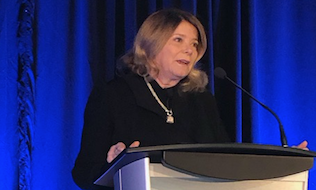
Since human papillomavirus can have a significant impact on the health of the working-age population, it’s necessary to talk to patients and employees at to look at the health benefits of vaccines, said Dr. Vivien Brown.
Brown, a family physician and vice-president of medical affairs at Medisys Health Group, discussed the current issues and epidemiology of HPV-related cancer in Canada and the value of prevention in the adult population at Benefits Canada‘s Employers Cancer Care Summit in Toronto on Feb. 27.
“When we talk about vaccine in my world, what we’re talking about is preventing the disease, not treating the disease,” she said. “Most vaccines on the market prevent infection. When we’re talking about an HPV vaccine, we’re talking about preventing cancer — it’s a whole new paradigm, a whole new standard. And that’s why, as a family doctor, [I find it] exciting to be preventing one of these cancers.”
Read: How HPV is causing more than just cervical cancer
According to Brown, half the population will have cancer at some point in their lives, and the current vaccine for HPV can reduce the risk of cervical cancer by 90 per cent. “We reduced genital warts, and that causes a lot of visits and a lot of costs to the system. And when we’re looking at the number of cases . . . we see a sizeable number of cases every year in Canada. We still lose about one woman a day to cervical cancer.”
The cost burden of HPV isn’t just related to cancer, it’s the time and the cost of pap tests and other diagnostics, she added. “Think of the resources and the time involved with these cancers and the difficulty in screening a large population.”
About 75 to 80 per cent of the population will get HPV at some point in their lives, said Brown, noting it’s a virus that will clear on its own for most people, the same way a body would clear up a cold. However, she added about 20 per cent of people are unable to fight it off naturally, which leads to persistent HPV and then cancer.
“We know the vaccine works very well. But what do patients, employers and health-care workers care about? They care about whether it’s safe and it works. When you look at safety, no matter which agency looked, everybody’s acknowledging this is a very safe vaccine.”
Read: How to implement a health screening program
Worldwide, 16 million doses of the vaccine has been delivered, she said. “Women remain at risk for HPV throughout their lifetime. We also know that as you get older, the subtypes are slightly different in the different age groups. This vaccine is even more important in women who are slightly older.”
The vaccine is currently administered to boys and girls between the ages of nine and 26, but Brown said she believes it should be offered to everybody over the age of 26 if they’re at risk. “Your patient, clients and employees are less likely to have recurrent disease if [they’ve] been vaccinated. So we need to advocate and prevent the cancers, not just treat them.”
Read more coverage of the 2019 Benefits Canada Employers Cancer Care Summit.
